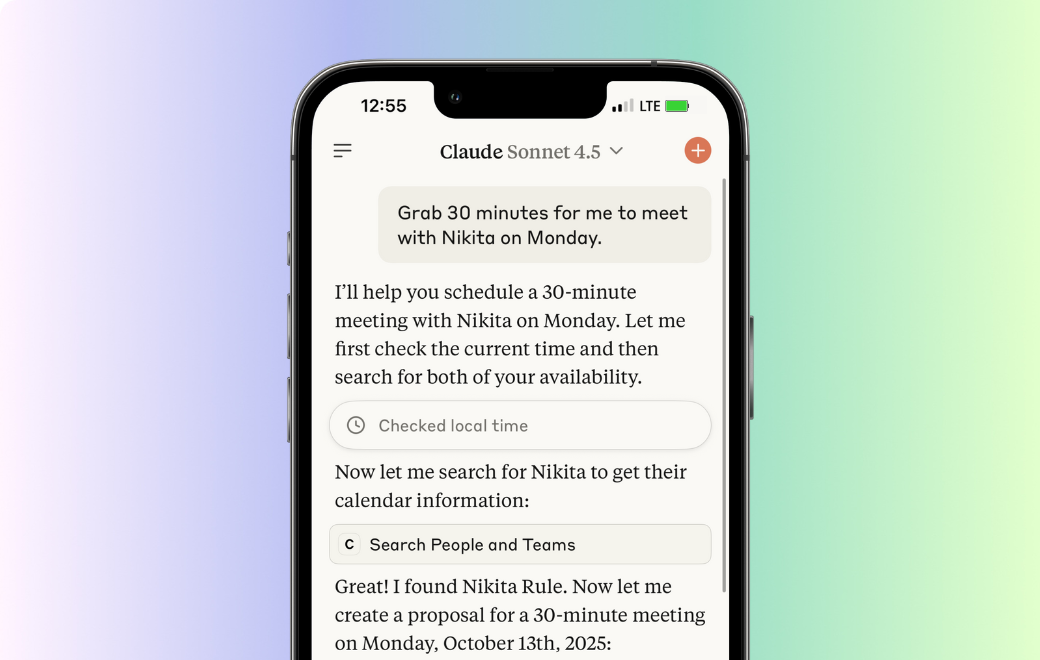AI technologies are revolutionizing virtually every industry: law, engineering, art, screenwriting, SEO, and everything in between. The travel industry is no exception. Because of the sheer volume of information that travel companies have, including customer patterns and preferences, AI and travel are the “perfect fit,” according to CWT, a leading travel management company.
Thanks to various AI-powered tools, business travel in particular has already been transformed. From trip planning and itinerary generation to travel booking, check-in processes, and expense management, virtually every touchpoint of corporate travel is now streamlined and more efficient. Read on for the nine key areas in which AI is changing business travel as we know it.
1. Travel planning and booking
One of the most visible ways AI has been integrated into business travel is through online travel assistance and support. Specifically, generative AI chatbots are now able to streamline travel planning and booking.
Once upon a time, travel agencies spoke to their customers, asked about their preferences and priorities, and used booking tools for flight and trip planning. Today, however, chatbots can support the entire travel experience, including the booking process, sending pre-arrival reminders, suggesting dining and entertainment options, and even giving weather updates at your destination.
According to a TIDIO study, increased use of chatbots is one of the biggest trends for 2023. For global companies whose employees travel internationally, chatbots, because they are multilingual, are a particular boon.
According to a Forbes article, one of the best examples of successful chatbot tech is Juliet by WestJet. Even before Covid, Juliet was able to handle 74% of client support requests. According to Forbes, when the pandemic started, Juliet saw a 45-fold increase in requests (which they system easily managed).
When it comes to the implementation of chatbots, travel leaders like Expedia and Kayak have been at the forefront. By using Expedia’s chatbot on Messenger, travelers can book a hotel through the app, only using the website to input payment details.
Airlines, too, are increasingly using bots to enable streamlined communications with their customers, helping to enhance the customer experience. For example, KLM Royal Dutch Airlines allows travelers to receive booking confirmations, check-in notifications, boarding passes and flight status updates via a Facebook Messenger bot.
But you don’t need to go through a travel company in order to leverage AI. Accessible AI tools like ChatGPT can generate entire itineraries for personal and business trips (see below).

2. Facial recognition technology
For exhausted travelers, few things are worse than waiting in a line at the airport or when checking into a hotel. Luckily, facial recognition technology is increasingly making this stress a thing of the past. Airlines like JetBlue, LOT and Adria Airways are using it to identify passengers and some hotels are using it for everything from check-in to unlocking the doors to their rooms. KLM Royal Dutch Airlines was one of the first airlines to begin testing biometric boarding technology at Schiphol Airport in 2017. That same year, British Airways also began its biometric boarding trials (self-service boarding gates) in airports.
3. Personalized travel experiences
AI-powered personalization has increasingly helped companies create frictionless business travel experiences for their employees. Artificial intelligence personalizes travel experiences by collecting and storing employee data using various data collections and pre-processing techniques like data mining. Then, with the help of predictive analytics and machine learning algorithms, it processes the employee data to detect preference patterns which it then uses to suggest booking options based on geographical locations.
And personalized travel experiences don’t end once travelers arrive at their destination. AI facilitates added convenience once at the hotel through the use of AI-driven Natural Language Processing (NLP) voice command control of hotels rooms (controlling lights, fans, ACs, machines or even opening and closing the curtains) as well as voice-based or text-based robot concierges to communicate with front desks (according to CWT, 50% of travelers say they would rather use a messaging service than talk on the phone while traveling – a figure that jumps up to 67% for millennials.)
Taking employees’ past preferences into account when booking business travel – from hotel room configurations and preferences to flight times, seating preferences, and dietary preferences – results in massive savings for companies. Needless to say, it also cuts down on hassles that expense management teams used to have to deal with, such as dealing with frustrated employees who used to book their own travel, bypassing recommended vendors.
4. Robot concierges
Robot concierges are one of the hottest new AI developments in business travel. Hilton’s Connie, used at Hilton McLean in Virginia, USA, is a robot concierge developed by IBM that answers guests’ questions about amenities, services and local attractions and dining establishments. The more guests interact with Connie, the more it learns, adapts, and improves its recommendations.
Yotel’s resident robot in New York (dubbed “yobot”) is designed specifically to collect and deliver guests’ luggage. This speeds up the check-in process and saves staff’s time.
The Crowne Plaza in California uses a robot called “Dash” to relieve the hunger pangs of its guests, among other things. “Dash” is used to deliver snacks, toiletries and other amenities. Would you expect less from a hotel located in Silicon Valley?
5. Risk management and traveler safety
But it’s not just in customer touchpoints that AI is impacting business travel. Risk management is also being transformed. For example, AI can use data to impact everything from flight forecasting (to predict travel disruptions due to inclement weather) as well as infrastructure incidents, or airport strikes. It can also help in the unlikely event that employees are stuck overseas in an emergency situations such as political strife, or natural disasters.
It does this by helping managers in real-time track their employees’ locations. It can also provide them with alerts via text and emails about emergencies occurring anywhere in the world their employees are located.
6. Travel expense management
Compiling travel expenses used to be one of the most tedious aspects of business travel. Masses of data would have to be connected from areas as disparate as vendors, booking platforms, and travel agents. Then the data had to be analyzed to figure out the areas where costs can be cut or lowered.
With AI, however, the data collection process is streamlined. Machine learning spots hidden patterns that the human eye cannot. Leveraging machine learning can help business travelers (and their managers) not only find the best time to book a hotel, but also take advantage of hotel or flight deals through notifications sent via a mobile app. Apps such as Hopper now archive trillions of data points and use AI and predictive analytics to anticipate drops in hotel and flight prices, resulting in significant savings for companies
Predictive analytics can also be used to analyze employees’ spending patterns, delivering insights on how to increase travel cost savings. This applies to spending on hotels, transportation, and other areas as well.
7. Data analytics and reporting
Zoho reports that a Grant Thorn survey found that CFOs ranked advanced analytics and AI among their top planned investments for the years to come.
This is no surprise when you consider how efficiencies in data analytics and reporting can help dramatically control travel spending, and streamline expense reporting. According to TravelPerk, AI also enables faster expense reporting by automating key systems. The result? The amount of time spent reviewing expenses is dramatically shortened, so employees can focus on other key areas of strategic growth.
An additional benefit is that AI can help auto-approve expenses that are compliant, even before the actual business travel takes place, meaning the employee is reimbursed more quickly.
8. Travel policy compliance
AI benefits go beyond saving time and money. AI-powered travel management software such as Rydoo, Coupa Travel, and SAP Concur can also help boost travel policy compliance. These programs not only capture miscategorized expenses by cross-checking merchant names across several sources, but many of them can automate the detection of policy violations, fraudulent reports, or duplicate expenses, leaving employees with more time to fix problems rather than poring through expense sheets trying to find them.
9. AI-powered time management tools
AI can also boost schedule management during business travel. One way you can do this is by adding travel time to Google Calendar (travel time is the amount of time spent getting from one destination to another). This not only lets you set realistic expectations for yourself while traveling, but also enables you to communicate your absence to team members.
Pro tip: Clockwise uses machine learning to detect meetings that require travel, then blocks off travel time automatically.
Another way to use AI in business travel is by using ChatGPT as your own personal assistant, thanks to the new Zapier ChatGPT plug-in. The plug-in harnesses the power of task automation which is key to time management.
While it is currently only available to ChatGPT Plus users, there are other ways to supercharge your calendar without typing detailed prompts. Clockwise, for example, is a time orchestration platform that uses AI to optimize your schedule both when you’re traveling and when you’re in the office. Clockwise will soon launch Clockwise AI, which builds the chat-based capabilities of GPT right into Clockwise’s powerful platform.
The brave new world of business travel
Experts agree that we’ve only begun to see the impact or AI on business travel. It’s hard to imagine the changes we can expect in the coming years, but a few things on the horizon include:
- Customer Engagement: Experts say we’ll see an increase in companies’ use of AI to analyze potential customers’ engagement with their social media.
- Drop the Baggage: an increase in smart baggage handling
Loyalty Rewards: increased use of AI to create personalized rewards for customer loyalty schemes


.gif)
.png)



